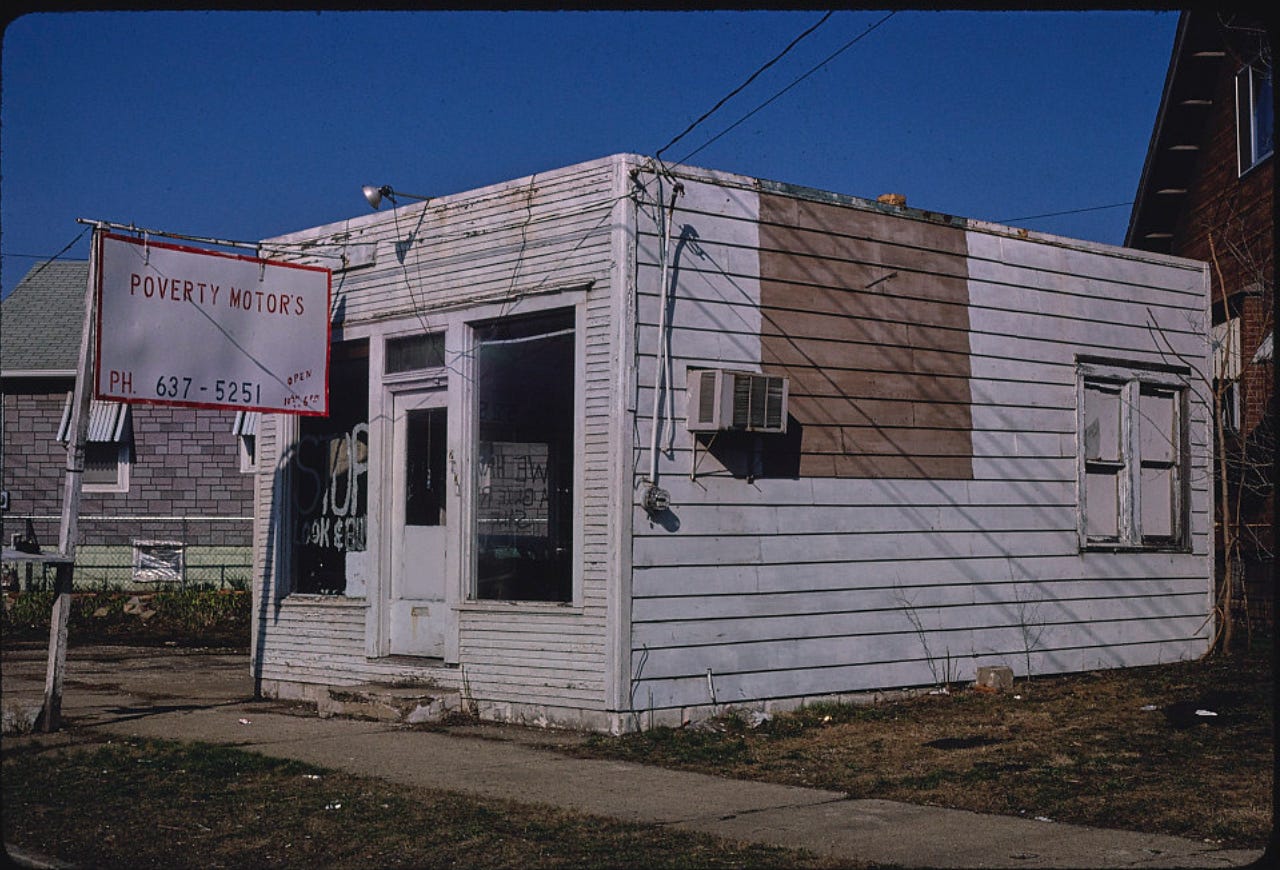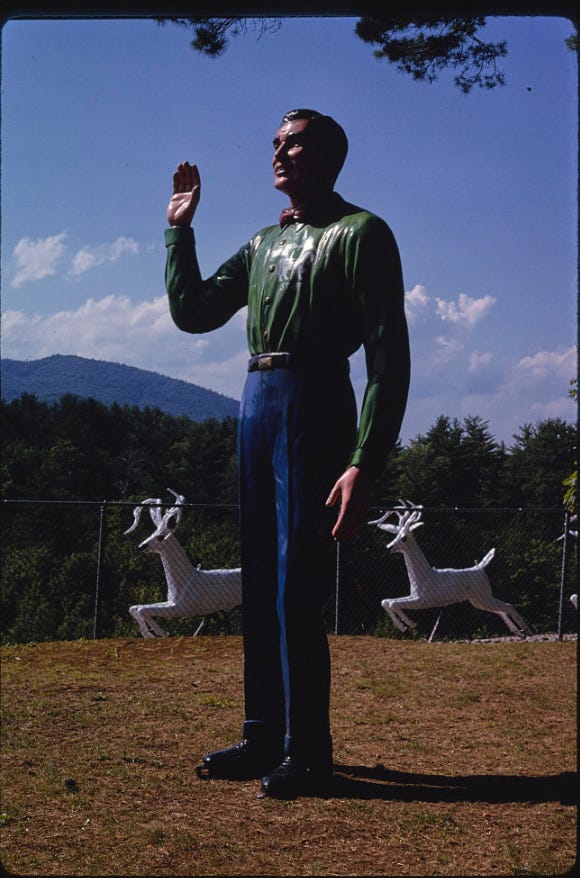I actually don't know how to be in community with others
When the only lesson your country has taught you is how to look out for yourself, that's what you end up doing

Notes: I engaged in a whole bunch of pandemic pod discourse last week, but punted on the “but what should I do about it?” part of that conversation. Fortunately, my friend Erica O. Turner (who, more importantly, is a brilliant Ed. Policy Professor whose book is great) went and did the work. Her Equity in Pandemic Schooling guide is terrific and should be read, shared and acted on widely.
Also: The Nice White Parents podcast is out now and, not surprisingly, it rules. Did it make you mad about segregation in NYC? Holler at the student activists behind Teens Take Charge and Integrate NYC. Alternately, do you just want to just talk about my main woman Barbara at the gala? Get at me!
I really need to tell you about this van I saw the other day.
Think about all the visible parts of an automobile. You’ve got your windshield, your frame, your wheels. Now picture the worst possible state each of those things could be in. The frame? Literally a Russian nesting doll of dents inside larger dents. The windows? So thoroughly cracked into a million spiderwebs that the van’s driver, an immensely tragic figure, had to contort his entire body to find a single hole to look through. But it’s the wheels that really broke my heart. Oh goodness, how do I say this gracefully? TIRES ARE NOT SUPPOSED TO TILT INWARD AT A FORTY FIVE DEGREE ANGLE!
I don’t know this van’s story, but it looked for all the world that this had been its general situation for quite some time now. And yet, here it was, still barreling down Interstate 94 despite all outward evidence that it should have burst into flames by now.
No, I didn’t get a picture. I was driving. And I was freaked out, because some days you see a van still barreling down the road despite having no business doing so and you realize oh no I actually know what it feels like to be in a van like that because I live in the nation-state equivalent of that van and the wheels are tilting inward more sharply and the cracks in the window are growing larger and the engine is puttering but here we are, still driving forward, still pretending like nothing is wrong.

I have been writing about the same topic for long enough that I’ve cycled through most of my hobby horses at least a couple times. And sure, as far as hobby horses go, you can get more mileage out of “our national addiction to individualism and white supremacy isn’t simply devastating to communities of color but is also at the root of why we can’t have any nice things” than most. It’s not clear, though, as to how much mere repetition helps move us forward.
On one hand, it is true: whether the thing you are craving right now is universal healthcare, an adequately funded, integrated public school system, an entire metropolitan area of thriving, healthy neighborhoods, a robust labor movement or so many other hallmarks of a healthy society, there is a consistent culprit keeping us from our dreams. And that means, in turn, that this particular culprit (if it isn’t clear yet, I’m talking about “white people getting mad”) is also at the root of why, in this moment of plague and devastation, we are without any of the collective supports that would buttress those blows. We are discovering the inherent limits of a nation that has always told its dominant racial group “we won’t make you do anything you don’t want to do as long as you keep saying this is the greatest country in the world.”
Here’s the problem I’m running into though. It is extremely easy to write (again and again and again) that we will never meaningfully attack racism and white supremacy (or get closer to the country we all deserve) without turning away from individualism (and yes, that includes the hyper-competitive shame fest that usually passes for white-antiracist advocacy) and towards community-building and mutualism. At some point, though, you have to close your laptop and actually face the world. And if you’re me, at least, that’s when you realize that centering community rather than your own individual nonsense is really, really hard and that you don’t actually know how to do it.

I am writing this from my bedroom. While I feel like I know a decent number of my neighbors, I can’t tell you any of the names of the folks whose houses I can currently see from my window at this exact moment. A block away is a Boys and Girls Club-style community center. I’ve never stepped foot into it. I can’t tell you anything about what it’s good at, why it’s valuable, whether there’s any way I can be useful there. When I flip between the tab where I’m writing this newsletter back to my inbox, I’ll find a black hole of drafts— unfinished letters I’ve been meaning to send to friends, including friends in incredibly tough spots. If I then move to last week’s calendar, I can relive a week full of calls and Zooms and opportunities to connect with others. Some of them I treated exactly with that spirit; as gifts, as windows into the lives of people to whom I’m lucky to be connected. Many others though I spent distracted by something else— perhaps what that person was thinking about me or, even worse, something totally random and unconnected to the conversation, something that seemed to matter at the time.
That paragraph was exhausting to write. I’m assuming it was equally exhausting to read. It likely comes off like a laundry list of to-dos that can only be solved by adding to an even more-overflowing catalog of things-to-be-done-and-reasons-to-feel-guilty. And goodness knows none of us have much use for the “just add more to your plate” impulse right now. We are spent. We are sad. We are in a global pandemic!
When I look at that list again, though, I realize it’s not time that’s holding me back. I could very well be focusing more on how I can contribute to community and less on how much I can take from others. In a pre-Covid world, I did have time to meet my neighbors. I was just embarrassed and nervous about having to suffer through a couple awkward initial interactions. I had time to write that unfinished letter, I just spent it chasing a dopamine high on one social media platform or another. I already had days packed full of potential connections with others, but I squandered them letting my mind wander off elsewhere.
This may read as incredibly solipsistic and naval-gazey. Who cares if I lead a self-centered and hermetic daily routine if I have community-minded politics? If I’m all for Medicare For All and reparations and for taxing billionaires and what have you, why should the state of my inbox be anybody’s concern? Why does it matter whether I’m a good or bad neighbor?
It matters because the world in which we live is the product not merely of the policies we support, but the collective sum of the ways that we know how to be in relationship with one another. It matters because hundreds of years of ancestral knowledge have reinforced the notion that people who look like me need only care about ourselves and our immediate families. It matters because those lessons aren’t unlearned merely by posting “Defund the Police” or flashing my Democratic Socialist membership card. It matters because the political affiliations of white people only go so far when our “vote with our feet” actions always devolve back towards selfishness.
I feel good about my political beliefs and values. That’s the easy part. Learning how to move past my own individualism, my own notion towards self-protection rather than community-building… well that’s so much harder.
So what am I doing? I’m trying to start and end my day with a set of questions. They look like this.
With whom have I been given the opportunity to be in relationship with today? To what extent did I treat those opportunities as gifts rather than obligations?
How much of my own mental time did I spend thinking about myself— about how I’m perceived, worries about my professional trajectory, my own experiences of disconnection or guilt?
What happens when I notice those moments and, instead of shaming myself for them, recognize them as opportunities to discover how much I crave connections with other people?
How frequently, after noticing those moments, did I take them as invitations to connect with others, to strengthen new bonds and repair old ones?
As I am spending more and more of my day in connection with others, what am I learning from doing so? How do these new patterns help evolve and grow my motivations, my passions, my politics?
Do these questions help turn my personal busted-to-hell car around and into a service shop? Do they help pull me out of my own head? Do they make me a slightly better friend and family member? I’ll keep you posted. I’m still learning.
In the meantime, whether I know you or not, I’m lucky to have you in my life. If there’s any way we can be in better community with each other, I’m all ears.
End notes: All pictures in this week’s issue from the Library of Congress’ “Roadside America” collection (public domain and an absolute delight). This week’s song: “Car and Driver” by the pride of Cabbagetown, The Rock*A*Teens.




I have so many thoughts on this, wowzer. Living in a cohousing community has taught me more about all of these questions than anything else in my entire life. I'm with a group of people who are a wide range of ages, professions, political affiliations, religious identities, and to some extent, racial backgrounds. It was founded as a Christian community, and though it's now interfaith, those roots feels so strong and special to learn from. You show up. You keep showing up. You hang in when you make each other so mad and disagree about things. Sometimes at a painful, acute level. And then there are seasons of easy joy and collaboration. Lots of that. An obscene amount. The key, I've realized, is the longterm investment and the assumption of inherent worthiness. No one has to earn their place in our community and can't really fail their way out (or at least that's VERY hard to imagine.) It doesn't matter if you "like" someone; it only matters if you love them. In some ways, I've learned, it's easier to love people than to like them. It's so weird. And so counter to everything white supremacy and capitalism and patriarchy teach us. FWIW, not that I've figured it all out. I've just been blessed with a serious great classroom with veteran, patient educators.
This is a killer list. "Gifts rather than obligations" - hoo boy. Also, if that was a Taylor Swift-fan dog whistle, I heard it! Me to America: "you stabbed my back while shaking my hand..."